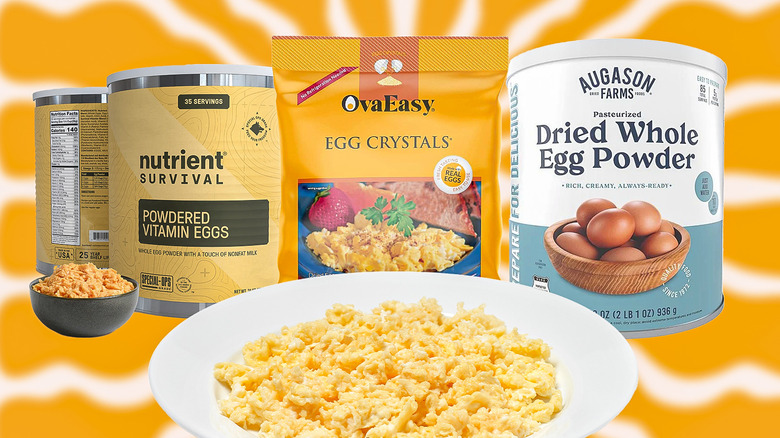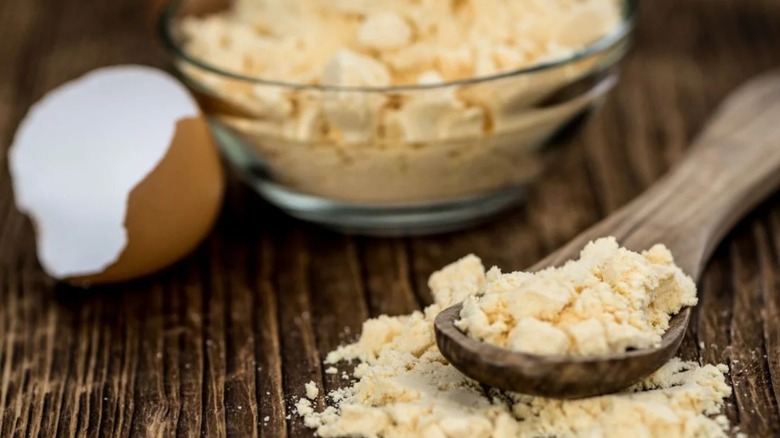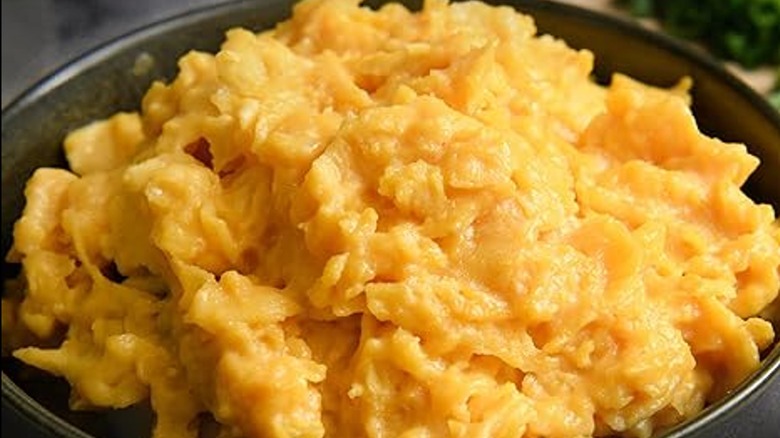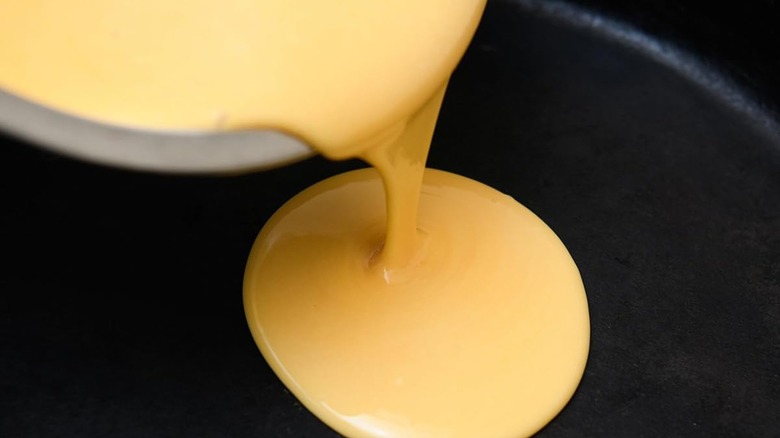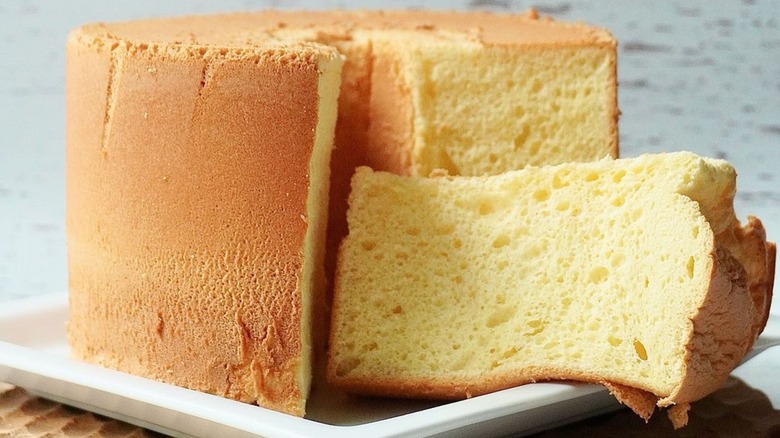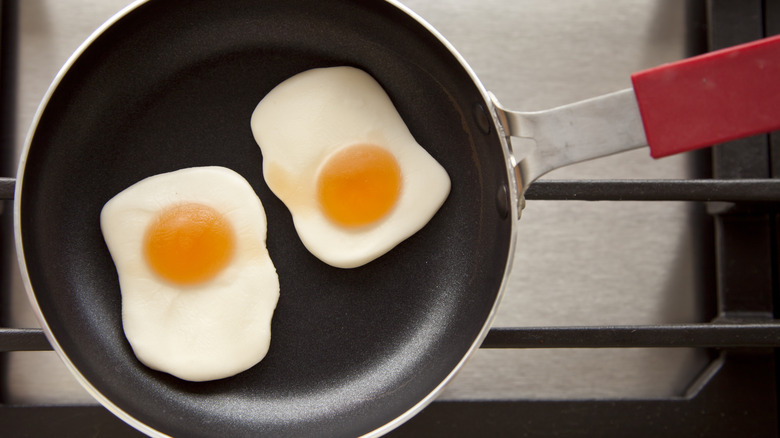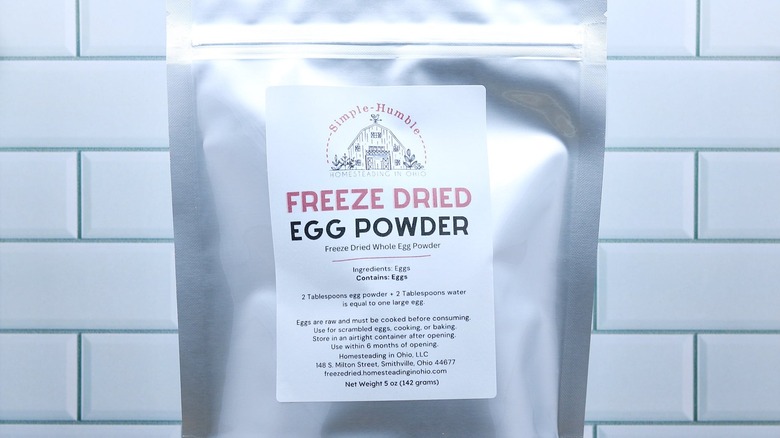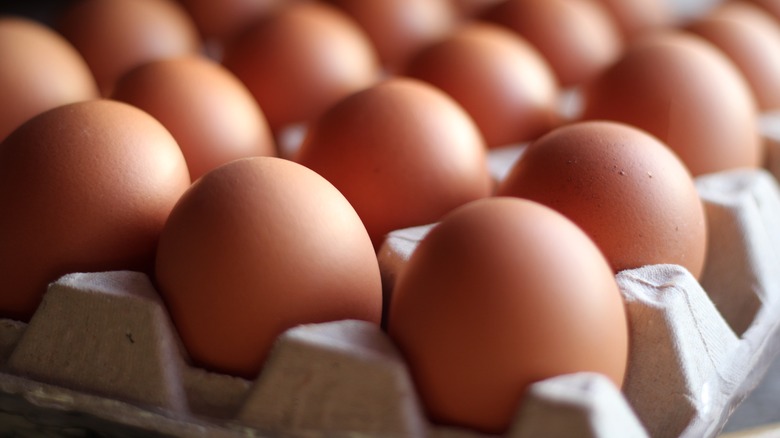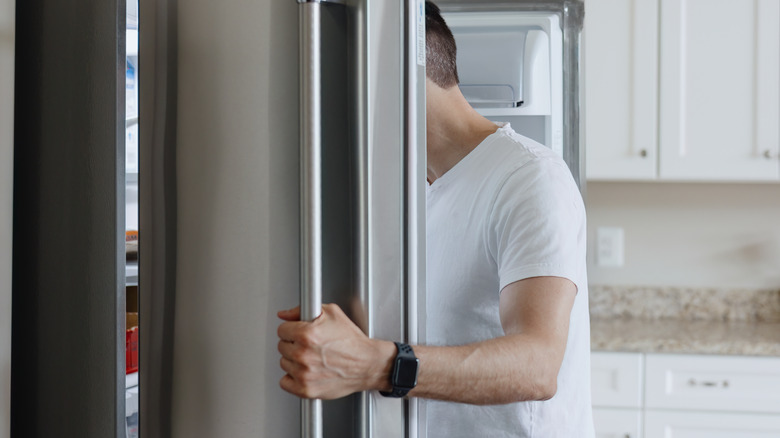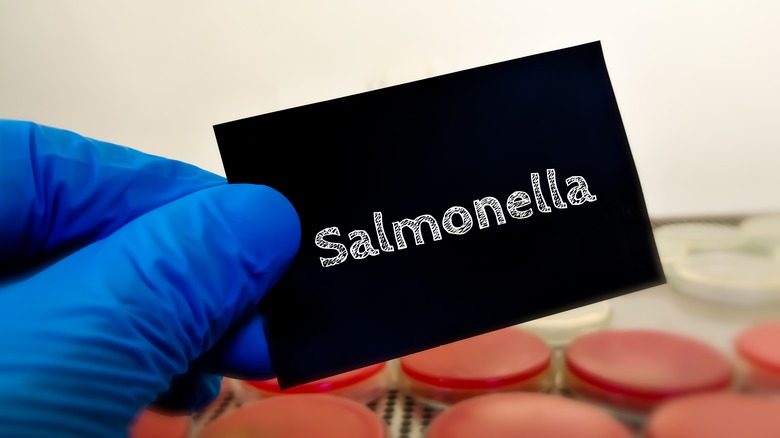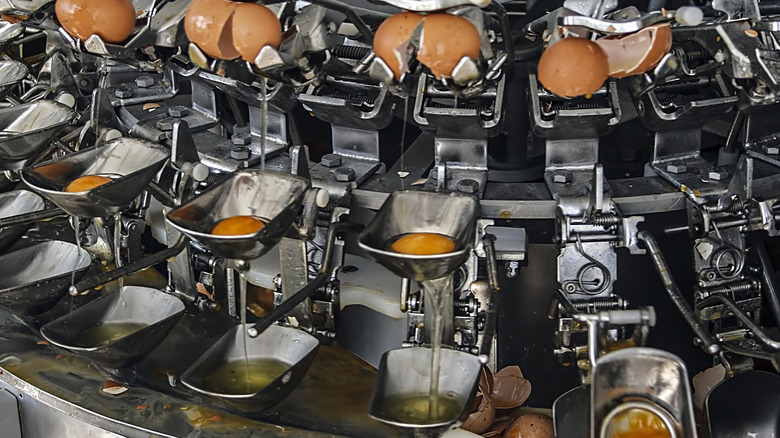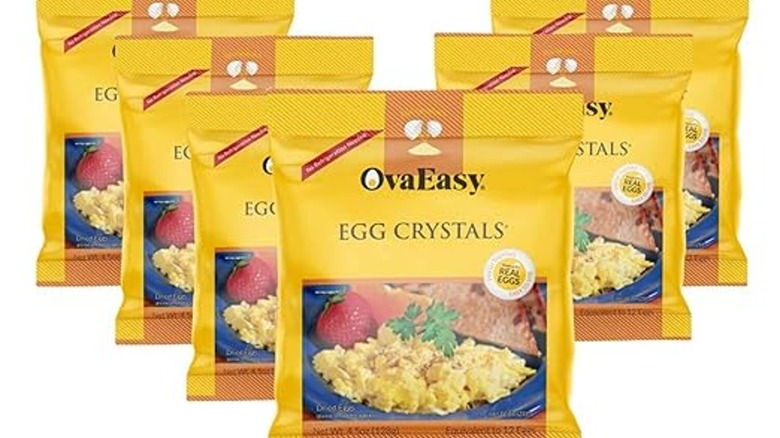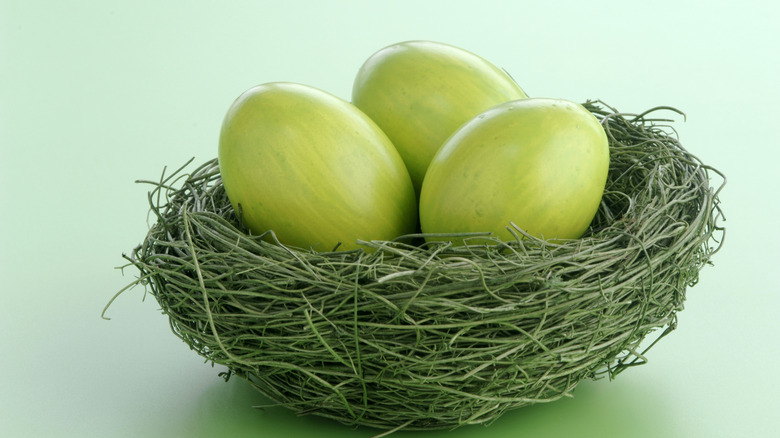14 Myths About Powdered Eggs You Need To Stop Believing
If you've been waiting for the apocalypse or an epic hike to try powdered eggs, it's probably because you've bought into some myths about them that just aren't true. Whether it's the taste, color, or texture that's got you feeling dubious, there have been some improvements to powdered egg production and packaging over the years that may have you considering using them more regularly. Granted, not all powdered eggs are created equally, but we've uncovered some information that might help you hone in on ones that are higher quality.
To help dispel a lot of the myths that people entertain about powdered eggs, we talked to two experts. One was Leonardo Etcheto, who is the CEO of Nutriom, the company that makes OvaEasy powdered eggs. The other was Cari Dunn of Simple Humble Homesteading in Ohio, a small business that makes and sells premium freeze-dried products, including powdered eggs. Learning the truth about the myths you once believed about powdered eggs can help you make more informed decisions about powdered egg purchases and usage in the future.
Powdered eggs don't taste good
The first myth to get out of the way is that powdered eggs don't taste good. If this has been your experience in the past or you've heard it from institutional food horror stories, it's time to set the record straight. Cari Dunn said that she's heard several people who think that "egg powder can be bland or taste funny." She said that "this may be true for some brands, but not for all of them. The higher the quality of eggs that the manufacturer uses, the better the taste and quality of the egg powder."
Of course, good taste requires that the company start with high-quality eggs in the first place. When we asked Dunn how to tell the difference between good and bad powdered eggs, she said, "Like with a fresh egg, the color will alert you to the quality of the eggs. A brighter color will often indicate that the eggs are higher quality. However, there may be some color loss during manufacturing."
Processing eggs at lower temperatures and freeze-drying them rather than spray-drying them at high temperatures tends to have a positive effect on egg flavor quality. This makes sense when you think about the difference in flavor and texture when you scramble eggs at a high temperature versus a low temperature. And, of course, keeping powdered eggs cool, dry, and out of the sunlight during storage helps, too.
There's only one type of powdered eggs
There are several differences that are important to note when choosing powdered eggs. One difference relates to egg quality, while another relates to how it's made.
One thing you'll want to know is the grade of the eggs used for the powder. Cari Dunn explained that one aspect of the grade relates to how firm the egg whites are, which "could potentially affect the egg powder." She says, "I recommend buying Grade A or AA egg powder, but most egg powders are made from Grade B." If texture matters, the grade might make a difference.
The other thing to note is whether the powder is the standard type that is dehydrated in a spray dryer or drum dryer or if it's a fully functional, freeze-dried product. Leonardo Etcheto explains that standard powdered eggs are often produced on an industrial scale and are "mainly intended to be used in baking as a binding agent or in feed formulas." On the other hand, "fully functional egg powder is a specialty product, more expensive, but intended to be used when 100% egg is required, such as scrambling eggs. It also makes a better baked product, with less formula adjustments than standard." Fully-functional, freeze-dried egg powder tends to be more expensive. However, Dunn says it has "a longer shelf life, more nutritional value, and [is] easier to reconstitute and closer to using a fresh egg."
All powdered eggs are good for scrambled eggs
While we've established that powdered eggs can taste good, they're not all equal in flavor and texture. Powdered eggs that aren't as high quality are probably better to use for other purposes, like baking or for mixing with other ingredients, rather than turning into a dish where the eggs are the main event, like scrambled eggs.
Leonardo Etcheto noted that many types of "powdered eggs, due to the high heat of the drying process, will normally be oxidized, which leads to browning and a cardboard-like taste." So, the type of powdered eggs you use matters a lot. As we mentioned previously, they're going to be a lot better if you choose ones that have been processed at lower heat levels. Etcheto explains that "Fully functional powdered eggs do not have this problem and are designed to be indistinguishable from shell eggs when cooked or baked."
Depending on the brand you use, you may still notice a difference in how powdered eggs behave and their texture when you scramble them. So, adding in some extra ingredients like veggies, meat, spices, and cheese might help normalize the flavor and texture.
The texture of powdered eggs is off-putting
The texture of powdered eggs may be different than that of fresh eggs. However, that doesn't mean that you won't like them or that you can't improve them.
So, what's the texture like? Leonardo Echeto explains: "In general, powdered eggs will be denser when cooked, not as fluffy as shell eggs." Cari Dunn notes that "they can have a slightly different texture and be more rubbery and flat than using a fresh egg in scrambled eggs." Others find them to be more grainy.
However, there are ways to give powdered eggs a better texture, especially when scrambling. Dunn says, "I use a fork to whisk the egg powder and whisk well. I let the pan preheat over low heat and cook the eggs on low heat so they are fluffy." To achieve even fluffier eggs, some cooks opt to use an electric mixer to blend the eggs with liquid for three minutes or more, ensuring that there's plenty of air incorporated into the mixture and that there aren't any uncombined lumps of dried eggs anywhere.
They aren't good substitutes for real eggs in recipes
If you had the idea that you couldn't use powdered eggs in recipes because they're not liquid or wouldn't work the same, you have it all wrong. In fact, once you try them and learn how to substitute them for real eggs in a recipe, you might even default to them for some purposes.
Cari Dunn tells us, "We use powdered eggs often in our home because of the convenience. We never notice a difference in baking or in cooking recipes. They taste just like using a fresh egg." Plus, you never have to worry about needing to run to the store to get fresh eggs for a recipe when there are powdered eggs in the cupboard.
To add powdered eggs to recipes, you simply need to reconstitute the egg and follow the recipe as usual. Dunn says, "Turning egg powder into liquid eggs is very easy. Simply combine 2 tablespoons of egg powder and 2 tablespoons of water. Mix well with a whisk or fork." However, when baking something like a cake with powdered eggs, it's also perfectly fine to mix dried eggs with your dry ingredients and the water with your wet ingredients instead of taking the extra step to reconstitute the egg.
They're not made from real eggs
A big myth that you'll often hear is that powdered eggs are made from chemicals instead of eggs. This is false. Leonardo Etcheto confirms: "This is not true; they are liquid eggs with the water removed."
Granted, there are plenty of egg replacement brands out there, and they are useful for a variety of purposes. However, eggless ones are clearly marked on the packaging as being plant-based, eggless, a substitute, or something similar. If in doubt, check the ingredient list. Ones with real eggs will have eggs listed, while egg substitutes rely on other proteins.
It's important to note, however, that there are several categories of powdered eggs. While most of the eggs you find are simple powdered whole eggs, others are powdered versions of just the whites or the yolks. There are some powdered versions with extra carbohydrates added in (sugar or corn syrup), enzymes added in, or free-flowing agents included. Plus, there are types meant to gel or whip better. So, be sure to read closely to know if you're getting what you need.
They don't have a long shelf life
When compared to fresh eggs, powdered eggs have a much longer shelf life. Refrigerated fresh eggs that you buy at the store are generally good for three to five weeks. However, powdered eggs last much longer.
The experts that we consulted mentioned that oxygen, humidity, temperature, and UV rays from sunlight have a big effect on how long freeze-dried products like powdered eggs last. Leonardo Etcheto says that "standard powdered eggs have a shelf life of one year, fully functional is three years. Both can be extended with special packaging." Cari Dunn notes, "We package ours in mylar bags with an oxygen absorber, so they have a shelf life of up to 25 years when stored properly."
However, those statistics apply to unopened containers of dried eggs. Dunn says that if you're not able to store leftovers in a "heat sealed mylar bag with an oxygen absorber" (which is the best option), she "would recommend storing leftover egg powder in a glass mason jar with a vacuum sealed lid. If kept out of sunlight, the egg powder should last a few months. If you notice it clumping or it changes in color or starts to smell bad, discard it."
All types lose a lot of nutritional value when they are turned into powder
Fresh eggs do lose some of their nutritional value when they're processed and turned into powdered eggs. This nutritional loss includes a reduction of some of their vitamins, minerals, and a bit of protein as well. However, the nutritional difference between fresh and powdered eggs is not significant if you choose powdered eggs that are freeze-dried rather than spray-dried.
Cari Dunn says that the nutritional difference between freeze-dried and spray-dried powdered eggs, however, is significant. "Freeze drying will remove more water and preserve more nutrients. Nutrient loss in dehydrating depends on the temperature used, but it can be up to a 40% loss in nutritional value. Freeze-dried foods retain about 97% of their nutritional value." Since the nutritional information is listed right on the package, you should be able to tell fairly quickly how the one you choose stacks up to fresh eggs
Powdered eggs require refrigeration
Usually, there's no need to store powdered eggs in the fridge. So, they're not going to take up valuable real estate there like fresh eggs do.
Not only do dried eggs not need to be refrigerated, but they actually shouldn't be refrigerated. Cari Dunn explains the reason: "Freeze-dried food should not be stored in the refrigerator or freezer because it will absorb moisture from the air. Moisture will cause the egg powder to spoil, so it will need to be discarded."
However, there are a few times when dried eggs do require refrigeration. Leonardo Etcheto says, "Refrigeration is required once you add water back to the powder and make a liquid egg." Once reconstituted, powdered eggs will keep in the fridge for four days. You should also store powdered eggs in the refrigerator in a sealed container if you mix them with any other solids to avoid the overgrowth of bacteria.
Dried eggs are safe from pathogen contamination
The process of drying eggs to turn them into powdered eggs kills off a large amount of the bacteria that might be present in them. However, some bacteria can still exist after processing.
Salmonella and other bacteria, such as enterococci and Bacillus, still sometimes take up residence in powdered eggs. Back when powdered eggs were popular in the years surrounding World War II, a lot of people got salmonella poisoning from eating them. So, some processes were developed and legislated in many countries to try to combat salmonella in dried eggs. Some of these methods include pasteurization, hot-room storage, and irradiation.
While salmonella should theoretically be absent from powdered eggs, it sometimes grows if the company ferments the product to remove glucose to create a more stable product with a better flavor and color. Even though the drying and pasteurization process should kill excess salmonella, it sometimes shows up in the finished product anyway. Luckily, there are methods companies can use to detect salmonella contamination in the finished product. Still, there have been recalls on powdered egg products from reputable companies because of possible salmonella contamination. So, handle powdered eggs with the same care as you would fresh eggs for the sake of health and safety.
Homemade powdered eggs are just as safe as store-bought ones
If you make powdered eggs at home or get them from a farmer who doesn't have a safe production setup, you can find yourself with contaminated eggs. Companies are able to use production methods and perform tests that home cooks aren't likely to be able to easily duplicate.
So, what do companies do to make powdered eggs safer? Leonardo Etcheto says that one thing they do is "pasteurization, where the liquid egg is heated for a short amount of time to kill bacteria and then cooled down again. This is hard to replicate properly at home. Industrial food handling facilities also process the eggs in an environment where all the air is filtered so no yeast and mold are present. This can be done at home but is difficult."
Another thing that food manufacturing companies have that most home cooks don't is the ability to test products to ensure safety. Cari Dunn explains, "Food manufacturers have specialized testing equipment to ensure that the egg power has a safe level of water activity. The testing equipment is cost prohibitive for the home user." Further, the FDA does environmental and product sampling and testing at manufacturing facilities to ensure continued product safety, which isn't happening at your house or if you get powdered eggs from individuals instead of legitimate companies.
They're not cost-effective
When you see the hefty price tag on some powdered eggs, you're likely to decide that they're not for you, assuming that they're not cost-effective. However, the logic for the cost-effectiveness of powdered eggs is a little more complicated than that.
Even if the going price per fresh egg is $0.30 to $0.50 each and good-quality freeze-dried eggs, like OvaEasy Egg Crystals, are available for closer to $1 per serving, the cost-effectiveness isn't necessarily a dollar-to-dollar measurement. As we've previously mentioned, if you get a high-quality, well-packaged type of powdered eggs and store them properly, they can last for years — even decades. Fresh eggs only last for a few weeks.
As the cost of fresh eggs rises, your initial investment at today's prices likely won't seem so expensive in the future. And when there's an egg shortage, powdered eggs will be there for you. If you're worried you won't use as much powdered eggs as comes in a package and will end up wasting them after opening, there's some good news on that front, too. Several companies with products claiming a 25-year shelf life, like Readywise Powdered Eggs, sell large emergency ration containers with several small mylar packets inside that provide more manageable serving sizes. So, you can use an individual package this month and not open another package for years to come without worrying about them all going bad.
They're difficult to find
For many people, finding powdered eggs is as easy as going to the local grocery store or specialty store. However, if you don't find them locally, there are some other options.
Buying them in person when you do your regular shopping is probably ideal. However, with fresh eggs available at the grocery store, powdered eggs may not be in stock due to the lack of high demand. Several grocery stores that don't have them in stock locally may have them available to order online or get as a delivery item. Another option for an in-person purchase is to look in the food section of a sporting goods or adventure supply store like REI or a local mom-and-pop one that sells freeze-dried meals for camping and hiking.
Of course, the easiest option may just be to buy powdered eggs online instead of hunting them down locally. You can get them from a variety of sellers on Amazon or directly from the websites of companies that have a good reputation for their powdered eggs. If you want to order a lot of powdered eggs for a restaurant or other purposes, you could go with a food service supplier instead.
They all turn green when cooked
One powdered egg myth that Leonardo Etcheto often hears is that powdered eggs "turn green when cooked." While you may have experienced such a thing, it's not the default for every type of powdered egg.
Etcheto explains that "this only happens to low-quality powders that are boiled for a long time and are therefore overcooked." So, if you don't relish a Dr. Seuss-style green eggs experience, don't cook them too long — or just buy better quality powdered eggs.
Some powdered eggs turn brown when cooked rather than green. This browning is due to the Maillard reaction. However, some companies have discovered that they could remove glucose from the eggs to prevent browning and improve the overall quality of the eggs. So, once again, it's not a universal phenomenon. Nothing's wrong if they turn brown, but we could understand why that wouldn't necessarily be ideal visually.
